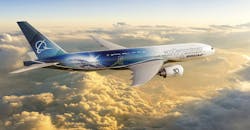Boeing Preps 777 for SAF, Other Tests
Boeing unveiled a new ecoDemonstrator aircraft that will be used to conduct test flights and ground research of about 30 new technologies in 2022, as part of the jet-builder’s program of aerospace sustainability and safety research.
This is the ninth aircraft to be adopted by Boeing for its EcoDemonstrator efforts since 2012. Among the projects to be pursued over the next six months are a water conservation system and technologies to improve operational efficiency. The converted 777-200ER jet will operate with a 30/70 blend of sustainable aviation fuel and conventional jet fuel, the highest level of SAF approved for commercial operation.
Continuing the research into the impact of SAF in reducing aircraft emissions is among the research targets.
The 777-200ER is the world’s largest twin-engine aircraft, an extended-range version of long-range jet in commercial service since 1995. It has a range of 5,240-8,555 nautical miles (6,027-9,842.5 milles / 9,700 to 15,840 km) and capacity for 368 passengers.
Boeing indicated it will work with NASA to test small vertical vanes installed on the aircraft wings, called SMART vortex generators, to determine the value of improved aerodynamic efficiency during takeoff and landing.
Another test will track the effectiveness of a system to conserve onboard water and reduce weight – and fuel consumption.
New, structural components and engine parts will be studied, as part of efforts to reduce fuel consumption during flight and to cut manufacturing waste.
A more environmentally sound refrigerant and a new fire suppression agent will be evaluated, to reduce greenhouse gas emissions.
Also, Boeing will evaluate a “heads-up enhanced vision” system (HUDs) for pilots to improve operational efficiency. HUDs – long in use by military pilots – present navigation, flight, and aircraft management data on a screen at the pilot’s eye level, allowing them to keep eyes on the surrounding environment rather than on flight controls.
"Boeing is committed to support our customers and enable the commercial aviation industry to meet our shared commitment to net zero carbon emissions by 2050," stated Stan Deal, Boeing Commercial Airplanes president and CEO. "The ecoDemonstrator program's rigorous testing of new technologies further enhances the environmental performance of our products and services and is invaluable to continuously improving safety."
